|
|
|
Sort Order |
|
|
|
Items / Page
|
|
|
|
|
|
|
| Srl | Item |
| 1 |
ID:
192097
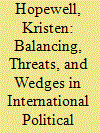

|
|
|
|
|
| Summary/Abstract |
Despite considerable tensions, China and India formed a surprising alliance at the WTO. Their alliance proved highly successful, bringing an end to American dominance and sharply curtailing the ability of the US to set the rules of global trade. However, the article shows, a key risk of soft balancing within an international institution is that, if successful, it may cause the dominant power to abandon the institution altogether. The US responded to China and India’s soft balancing by turning away from the WTO, actively undermining its rules and enforcement mechanism, and pursuing its interests through bilateral channels. The article thus identifies a distinct and previously unrecognized wedge strategy—vertical forum-shifting, or moving the action from international institutions to bilateral negotiations, to split an adversary coalition.
|
|
|
|
|
|
|
|
|
|
|
|
|
|
|
|
| 2 |
ID:
157973
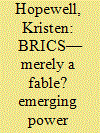

|
|
|
|
|
| Summary/Abstract |
The much hyped rise of the BRICS (Brazil, Russia, India, China and South Africa) has lately been met with equally fervent declarations of their demise. Amid slowing growth in many of these countries, the prevailing view now appears to be that the rise of the BRICS was little more than an illusion. In this article, however, I contest this assessment by arguing that the emerging powers were never solely, nor most importantly, merely an economic phenomenon. Instead, I show that emerging powers—specifically Brazil, India and China—have become an important political force in the global trading system and have had a profound and lasting impact on the World Trade Organization (WTO). Contrary to the widespread assumption that these countries are too diverse to ally, I argue that the emerging powers displayed a remarkable degree of unity and cooperation, working in close concert to successfully challenge the dominance of the US and other established powers. As evidenced by the collapse of the Doha Round, the collective rise of Brazil, India and China substantially disrupted the functioning of one of the core institutions of the liberal economic order created under US hegemony.
|
|
|
|
|
|
|
|
|
|
|
|
|
|
|
|
| 3 |
ID:
155698
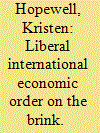

|
|
|
|
|
| Summary/Abstract |
“[W]hat Trump has done so far represents an intensification and deepening of existing patterns of US behavior in the trading system rather than a fundamental change.”
|
|
|
|
|
|
|
|
|
|
|
|
|
|
|
|
| 4 |
ID:
158922
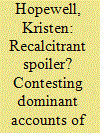

|
|
|
|
|
| Summary/Abstract |
India is frequently cast as a troublemaker and blamed for the breakdown of the Doha Round. This article provides a critical re-reading of India’s trade policy and its position in multilateral trade negotiations. It challenges the widespread characterisation of India as a recalcitrant spoiler, intent on derailing trade liberalisation at the WTO. It shows that with the emergence of its highly-competitive, export-oriented services sector, India became one of the leading advocates of global services trade liberalisation in the Doha Round. Yet, not unlike the traditional powers, India’s offensive trade interests are also combined with significant defensive concerns in agriculture.
|
|
|
|
|
|
|
|
|
|
|
|
|
|
|
|
| 5 |
ID:
177072
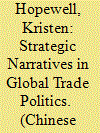

|
|
|
|
|
| Summary/Abstract |
The characterization of the United States as a liberal hegemon seeking to uphold free-market capitalism against the illiberal state capitalism of China and other emerging powers has become commonplace, along with the attendant notion that American economic openness has been exploited by the unfair trade practices of other states. Given their dominance in US political discourse and role in shaping contemporary policy—including fuelling Trump’s trade wars and aggressive unilateral trade actions against all of the United States’ major trading partners, his attacks on the World Trade Organization, and talk of a “new Cold War” between the United States and China—these claims merit far greater scrutiny. In this article, I challenge the stark dichotomy frequently drawn between American “free-market capitalism” and the “state capitalism” of its emerging challengers, arguing that this forms part of a strategic narrative deployed for political purposes, including legitimating the United States’ use of aggressive trade policy measures. An examination of the American hegemon’s actual trade and industrial policies complicates this characterization. Despite presenting itself as a promoter and defender of free trade, I show that the unifying logic of US trade policy has always been the promotion of American economic interests: the United States has engaged in considerable state intervention and trade protectionism, both to shield vulnerable industries and support others to achieve and maintain their global dominance.
|
|
|
|
|
|
|
|
|
|
|
|
|
|
|
|
| 6 |
ID:
186381
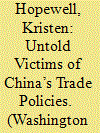

|
|
|
|
|
| Summary/Abstract |
China’s trade policies have come under intense scrutiny amid the ongoing US-China trade war. Yet with attention focused on trade conflict between the United States and China, the wider effects of China’s trade policies are being largely ignored.
|
|
|
|
|
|
|
|
|
|
|
|
|
|
|
|
| 7 |
ID:
179810
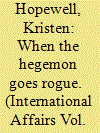

|
|
|
|
|
| Summary/Abstract |
Under President Trump, the United States abdicated its traditional leadership role in the trading system, abandoning multilateralism for aggressive unilateralism and launching an active assault on the World Trade Organization (WTO). Most strikingly, the US blocked appointments to the Appellate Body, jeopardizing the WTO's dispute settlement mechanism. With the trade regime in crisis, a key question has been whether other states would have the will and capacity to lead system-preserving initiatives. While most attention has focused on whether China—widely seen as the chief hegemonic challenger to the US—would assume the mantle of leadership, there has been considerable scepticism about the European Union's capacity to exercise leadership amid the crisis. The EU has generally been seen as punching below its weight in terms of leadership at the WTO. In this article, however, I argue that it is the EU, rather than China, that has taken the lead in advancing concrete initiatives directed at defending and maintaining the multilateral trading system. The EU led the creation of an interim appeals arrangement to replace the defunct Appellate Body—in effect, creating an ‘Appellate Body minus the US’. Although the rules-based multilateral trading system remains under threat, it is the EU, not China, that is acting as a system-preserving power, leading efforts to defend the established order.
|
|
|
|
|
|
|
|
|
|
|
|
|
|
|
|
|
|
|
|
|